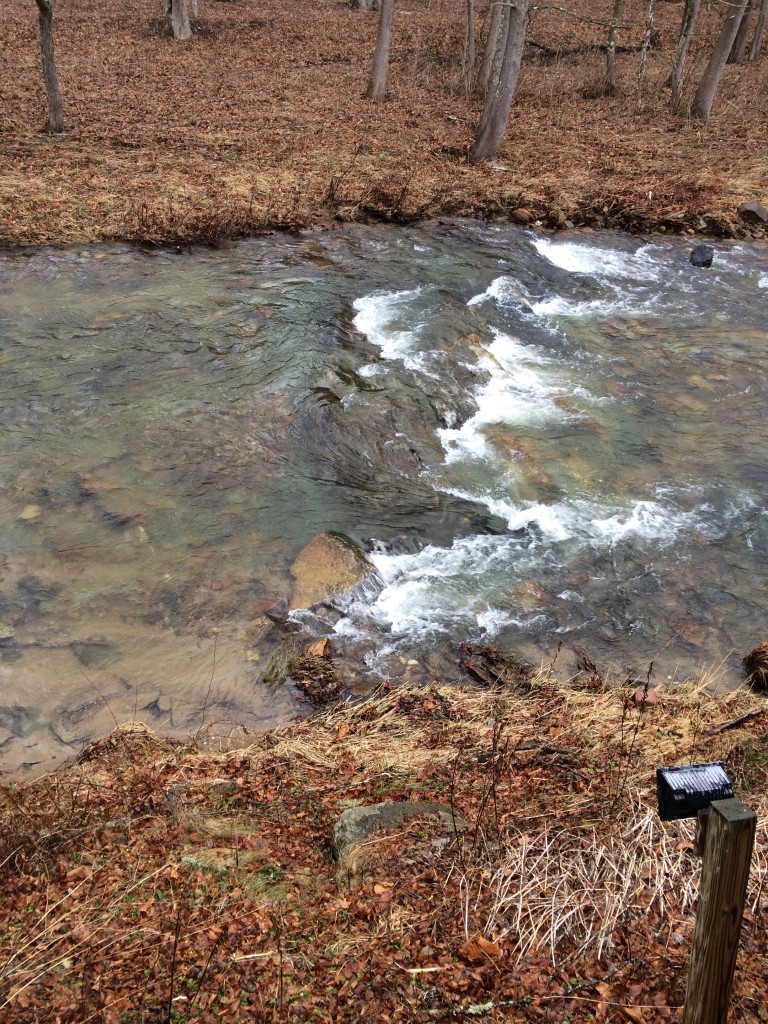This winter of 2015 truly made the water rise in many a mountain stream! The Wilson creek near us is just one of those that rises out of its banks revealing nature’s power. Snow and ice melt followed by rain combine to create quite a show.

The Wilson Creek so often is a truly beautiful clear mountain stream with the stones lining the bed easily viewed from its banks. Today however, as this picture shows, the water levels, silt from the disturbed creek bed and rapids prevent us from seeing them. There is a strong current causing those rapids above the larger stones and the normally babbling creek is roaring loudly as it rushes downstream to join the New River.
All of my life there have been local mountain sayings that I’ve heard and of course repeated, complete with a North Carolina southern drawl as literal fact. And I have used this page’s title often–feeling quite sure I knew exactly what it meant. “The Good Lord willing and the ‘creek’ don’t rise” is just one of them. I have understood it to have come from those days when traveling for many was affected by the rising of the creek in bad weather.
I read a letter from my grandfather to my grandmother just last week describing a hunting trip with his father on their land in the early 1930s. They had taken a car to drive back into the mountains and when they came out of the woods their car became stuck in a stream that had risen with an apparent flash flood after a thunderstorm. They had walked out to find family who went to help pull them out of the water with a horse and ropes. My grandfather relates they were there for several hours in the pouring rain and that their help had to ride in “seven miles” to reach them.
When you write there is a passion that develops to find the history behind things–the truth behind stories or sayings you have heard. And when I sat down to write this story about the creek rising I began searching for the history and meaning of the old saying that is the title of this page. I assumed it would be attributed to a time of great flooding in some mountain community. But as is so often the case, the history of the “Creek don’t rise” has very little to do with creeks and water.
In the deep South in the early 1800s there were tribes of the Indian nation Creek living in Alabama and what was then Mississippi. Their history is recorded as part of the War of 1812. The Creek Nation Council had entered into a treaty for trade with the US in part out of opposition to the British. (EHT, 2009) The following is a description of events that broke the treaty and relationship.
“By 1813, interference from the Spanish and the English pushed the Americans into the Civil War. White settlers in the immediate area were not threatened until a group of whites attacked a Red Stick supply train close to Burnt Corn Creek in July, 1813.In retaliation the Creeks marched on Fort Mims in August, 1813 where they massacred men, women, and children. Depending on the source used anywhere from 250-550 settlers were murdered. The folks at the Fort Mim’s site explain that the saying, “the good Lord willing, and the Creeks don’t rise” came about following the massacre…..” – See more at: http://historyiselementary.blogspot.com/2009/10/if-creeks-dont-rise.html#sthash.h83pqOor.dpuf

